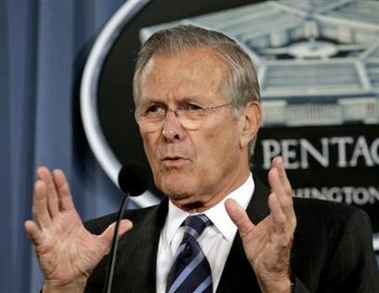WASHINGTON - Two top Pentagon commanders said Thursday that spiraling
violence in Baghdad could propel Iraq into outright civil war, using a
politically loaded term that the Bush administration has long avoided.

Secretary of Defense
Donald Rumsfeld gestures during a news conference at the Pentagon in
Washington August 2, 2006. [Reuters] |
The generals said they believe a full-scale civil war is unlikely. Even so,
their comments to Congress cast the war in more somber hues than the
administration usually uses, and further dampened lawmakers' hopes that troops
would begin returning home in substantial numbers from the widely unpopular war
in time for this fall's elections.
"I believe that the sectarian violence is probably as bad as I have seen it,
in Baghdad in particular, and that if not stopped it is possible that Iraq could
move toward civil war," Gen. John Abizaid, the top U.S. commander in the Middle
East, told the Senate Armed Services Committee.
Gen. Peter Pace, chairman of the Joint Chiefs of Staff, told the senators,
"We do have the possibility of that devolving into civil war."
White House press secretary Tony Snow, flying with President Bush to Texas
aboard Air Force One, said the generals had "reiterated something we've talked
about on a number of occasions, which is the importance of securing Baghdad,
which is why ... you're going to see more and more of a troop presence in
Baghdad. ... Obviously, sectarian violence is a concern."
Asked specifically about the generals' comments about a civil war, Snow said,
"OK, well, I don't think the president is going to quibble with his generals on
their characterizations."
Bush and Defense Secretary Donald H. Rumsfeld have steadfastly refused to
call the situation in Iraq a civil war, although Rumsfeld acknowledged at a news
conference Wednesday that the violence was increasing.
Asked whether the United States would continue to have a military mission in
Iraq if civil war broke out, Rumsfeld declined to respond directly, saying he
didn't want to give the impression he presumed there would be a civil war. He
said the question must ultimately be handled by the Iraqis.
"Our role is to support the government. The government is holding together.
The armed forces are holding together," Rumsfeld said at the Senate hearing
Thursday.
There are currently about 133,000 U.S. forces in Iraq. The Pentagon has
recently decided to extend the deployment of some 3,500 troops and send them
into Baghdad, along with Iraqi forces, to bolster security.
Last year, Army Gen. George Casey, then the top U.S. commander in Iraq,
expressed hopes of significant troop cuts this year, comments Abizaid seemed to
temper on Thursday.
"It's possible to imagine some reductions in forces, but I think the most
important thing to imagine is Baghdad coming under the control of the Iraqi
government," Abizaid said.
Abizaid raised the specter of a rise in U.S. casualties, saying, "I think
it's possible that in the period ahead of us in Baghdad that we'll take
increased casualties - that's possible."
Many voters have tired of the 3-year-old war, which has cost more than 2,500
U.S. lives and more than $250 billion dollars.